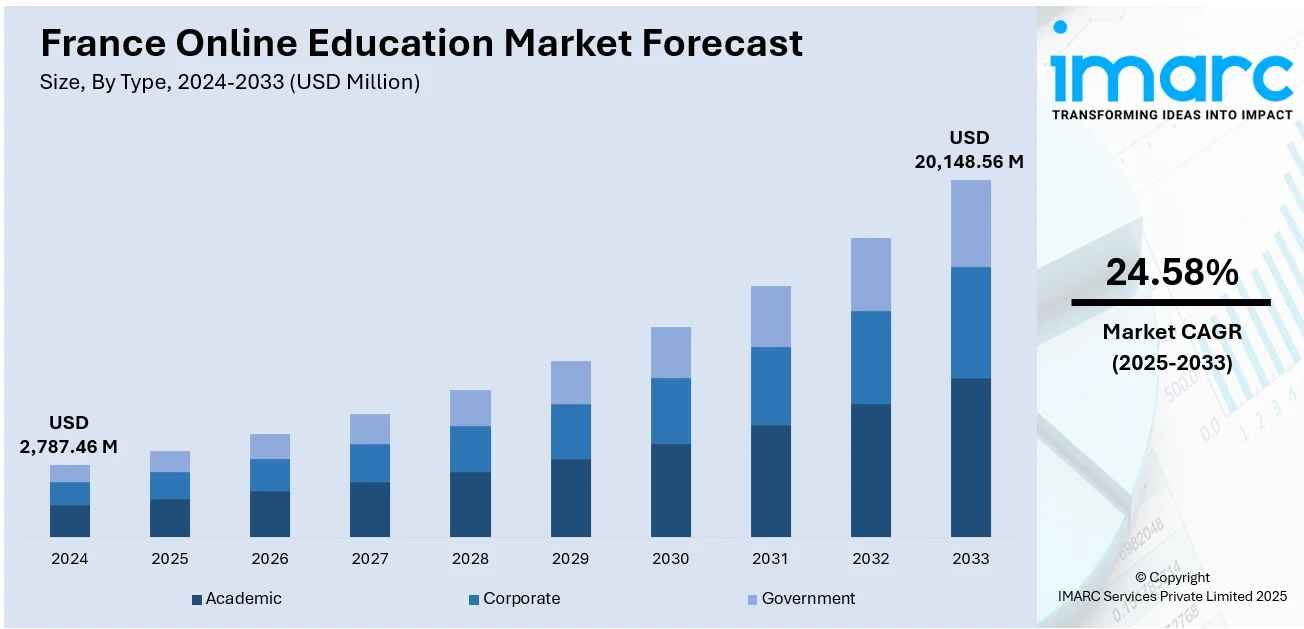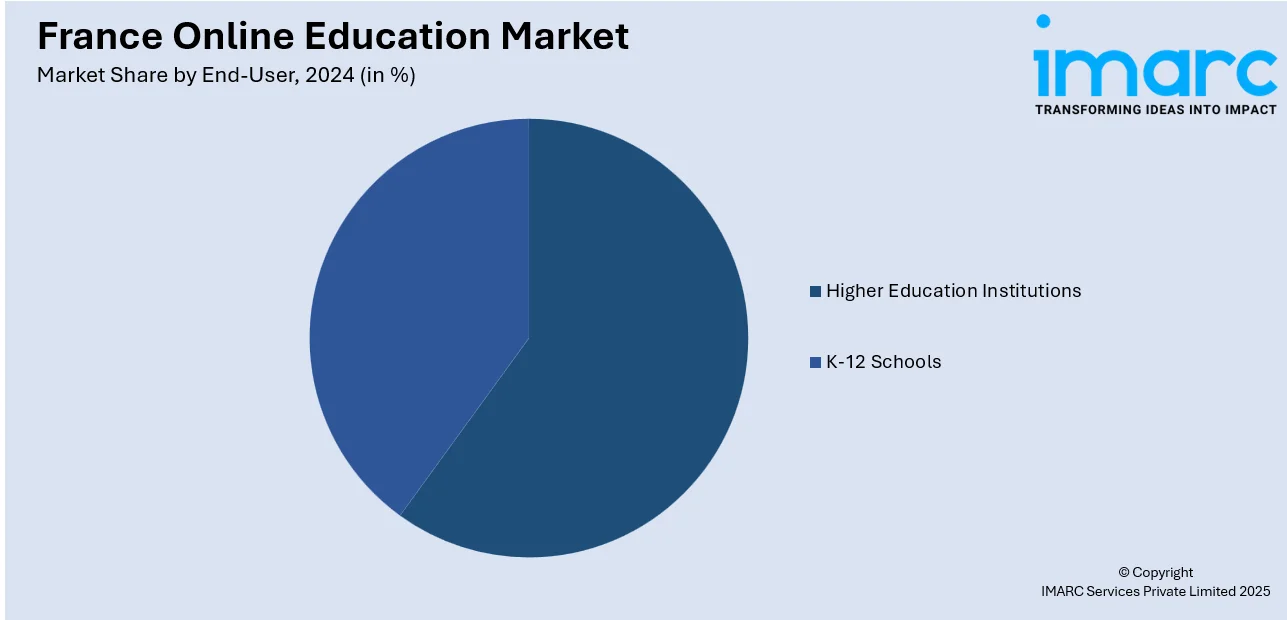
France Online Education Market Size, Share, Trends and Forecast by Type, Provider, Technology, End-User, and Region, 2025-2033
France Online Education Market Overview:
The France online education market size reached USD 2,787.46 Million in 2024. Looking forward, IMARC Group expects the market to reach USD 20,148.56 Million by 2033, exhibiting a growth rate (CAGR) of 24.58% during 2025-2033. The market is driven by national digitalization initiatives supporting ICT adoption in schools and universities, backed by substantial public investments. Increasing demand for flexible, professional upskilling programs aligned with France’s shifting labor market is further accelerating online learning uptake. Integration of artificial intelligence in educational platforms is enriching learning personalization, further augmenting the France online education market share.
|
Report Attribute
|
Key Statistics
|
|---|---|
|
Base Year
|
2024
|
|
Forecast Years
|
2025-2033
|
|
Historical Years
|
2019-2024
|
| Market Size in 2024 | USD 2,787.46 Million |
| Market Forecast in 2033 | USD 20,148.56 Million |
| Market Growth Rate 2025-2033 | 24.58% |
France Online Education Market Trends:
National Digitalization Strategies in Education
France’s online education market is experiencing considerable momentum supported by comprehensive national strategies to digitalize its education sector. The French government has rolled out initiatives such as the Éducation Numérique pour Tous (Digital Education for All), which emphasizes enhancing digital literacy and integrating technology into teaching methods. Significant investments are being directed toward equipping schools with advanced ICT infrastructure, providing teachers with digital pedagogical training, and expanding online resources for students. Universities are also adopting blended and fully online models to enhance accessibility and academic flexibility. As per recent industry reports, French universities attract approximately 63% of international students, while the country’s business schools and engineering schools account for around 15% and 8%, respectively. Among the disciplines chosen within French universities, fundamental sciences lead in popularity, drawing 33% of international enrollments, surpassing fields like humanities, social sciences, and economics. French institutions increasingly collaborate with digital content creators to develop tailored online modules across subjects ranging from mathematics to vocational training. Furthermore, platforms such as FUN-MOOC—supported by the Ministry of Higher Education—are making free, high-quality courses widely accessible to learners. This ongoing institutional commitment to digital integration is reinforcing market expansion. Collectively, these efforts provide a critical foundation for France online education market growth, setting the stage for further technological advancements in learning. Furthermore, international collaborations with global universities allow French professionals to access specialized qualifications recognized across Europe and beyond. This alignment between labor market needs and the availability of targeted, accessible learning programs is a major factor driving growth in the online education sector across France.

To get more information on this market, Request Sample
Expanding Adoption of Artificial Intelligence in Learning Platforms
Artificial intelligence (AI) is playing an increasingly transformative role in shaping France’s online education landscape by enabling personalized and adaptive learning experiences. AI-driven educational platforms are being employed to assess learner performance in real time and adjust course content to fit individual progress and learning styles. This has enhanced user engagement, particularly in language learning, STEM subjects, and professional training programs. Major French edtech startups and international providers are leveraging machine learning algorithms to offer intelligent tutoring, predictive feedback, and gamified content that improves educational outcomes. On June 10, 2025, OMNES Education, a French private higher education group with 15 schools and 40,000 students, launched the Intelligence Lab at its engineering school ECE to drive AI integration in education by 2027. This initiative introduces AI-driven curricula, partnerships with companies like Renault and MBDA, and tools like Boost’IA and IA Battles to personalize learning across disciplines. With France’s online education sector poised for substantial growth, OMNES’s strategic emphasis on AI-enabled learning platforms strengthens its position in the evolving France online education market. Additionally, data analytics generated by these platforms help educators refine instructional strategies and identify gaps in student understanding. Universities are also experimenting with AI-integrated curricula to support both distance learners and on-campus students in hybrid environments. This integration of advanced technologies is redefining how knowledge is delivered and consumed, positioning online platforms as central tools for both academic achievement and professional advancement in France’s digital future.
France Online Education Market Segmentation:
IMARC Group provides an analysis of the key trends in each segment of the market, along with forecasts at the country and regional levels for 2025-2033. Our report has categorized the market based on type, provider, technology, and end-user.
Type Insights:
- Academic
- Higher Education
- Vocational Training
- K-12 Education
- Corporate
- Large Enterprises
- SMBs
- Government
The report has provided a detailed breakup and analysis of the market based on the type. This includes academic (higher education, vocational training, and K-12 education), corporate (large enterprises and SMBs), and government.
Provider Insights:
- Content
- Services
The report has provided a detailed breakup and analysis of the market based on the provider. This includes content and services.
Technology Insights:
- Mobile E-Learning
- Rapid E-Learning
- Virtual Classroom
- Others
The report has provided a detailed breakup and analysis of the market based on the technology. This includes mobile e-learning, rapid e-learning, virtual classroom, and others.
End-User Insights:

- Higher Education Institutions
- K-12 Schools
The report has provided a detailed breakup and analysis of the market based on the end-user. This includes higher education institutions and K-12 schools.
Regional Insights:
- Paris Region
- Auvergne-Rhône-Alpes
- Nouvelle-Aquitaine
- Hauts-de-France
- Occitanie
- Provence Alpes Côte d’Azur
- Grand Est
- Others
The report has also provided a comprehensive analysis of all major regional markets. This includes Paris Region, Auvergne-Rhône-Alpes, Nouvelle-Aquitaine, and Hauts-de-France, Occitanie, Provence Alpes Côte d’Azur, Grand Est, and Others.
Competitive Landscape:
The market research report has also provided a comprehensive analysis of the competitive landscape. Competitive analysis such as market structure, key player positioning, top winning strategies, competitive dashboard, and company evaluation quadrant has been covered in the report. Also, detailed profiles of all major companies have been provided.
France Online Education Market News:
- On March 11, 2025, French e-learning company Pimenko was officially recognized as a Moodle Certified Partner after completing a rigorous audit by Moodle HQ, strengthening its position in France’s rapidly expanding online education sector. This certification highlights Pimenko’s decade-long contributions to Moodle’s ecosystem, including plugin development and integration expertise, as demand for open-source LMS platforms accelerates.
France Online Education Market Report Coverage:
| Report Features | Details |
|---|---|
| Base Year of the Analysis | 2024 |
| Historical Period | 2019-2024 |
| Forecast Period | 2025-2033 |
| Units | Million USD |
| Scope of the Report |
Exploration of Historical Trends and Market Outlook, Industry Catalysts and Challenges, Segment-Wise Historical and Future Market Assessment:
|
| Types Covered |
|
| Providers Covered | Content, Services |
| Technologies Covered | Mobile E-Learning, Rapid E-Learning, Virtual Classroom, Others |
| End-Users Covered | Higher Education Institutions, K-12 Schools |
| Regions Covered | Paris Region, Auvergne-Rhône-Alpes, Nouvelle-Aquitaine, and Hauts-de-France, Occitanie, Provence Alpes Côte d’Azur, Grand Est |
| Customization Scope | 10% Free Customization |
| Post-Sale Analyst Support | 10-12 Weeks |
| Delivery Format | PDF and Excel through Email (We can also provide the editable version of the report in PPT/Word format on special request) |
Key Questions Answered in This Report:
- How has the France online education market performed so far and how will it perform in the coming years?
- What is the breakup of the France online education market on the basis of type?
- What is the breakup of the France online education market on the basis of provider?
- What is the breakup of the France online education market on the basis of technology?
- What is the breakup of the France online education market on the basis of end-user?
- What is the breakup of the France online education market on the basis of region?
- What are the various stages in the value chain of the France online education market?
- What are the key driving factors and challenges in the France online education market?
- What is the structure of the France online education market and who are the key players?
- What is the degree of competition in the France online education market?
Key Benefits for Stakeholders:
- IMARC’s industry report offers a comprehensive quantitative analysis of various market segments, historical and current market trends, market forecasts, and dynamics of the France online education market from 2019-2033.
- The research report provides the latest information on the market drivers, challenges, and opportunities in the France online education market.
- Porter's five forces analysis assist stakeholders in assessing the impact of new entrants, competitive rivalry, supplier power, buyer power, and the threat of substitution. It helps stakeholders to analyze the level of competition within the France online education industry and its attractiveness.
- Competitive landscape allows stakeholders to understand their competitive environment and provides an insight into the current positions of key players in the market.
Need more help?
- Speak to our experienced analysts for insights on the current market scenarios.
- Include additional segments and countries to customize the report as per your requirement.
- Gain an unparalleled competitive advantage in your domain by understanding how to utilize the report and positively impacting your operations and revenue.
- For further assistance, please connect with our analysts.
 Request Customization
Request Customization
 Speak to an Analyst
Speak to an Analyst
 Request Brochure
Request Brochure
 Inquire Before Buying
Inquire Before Buying




.webp)




.webp)












